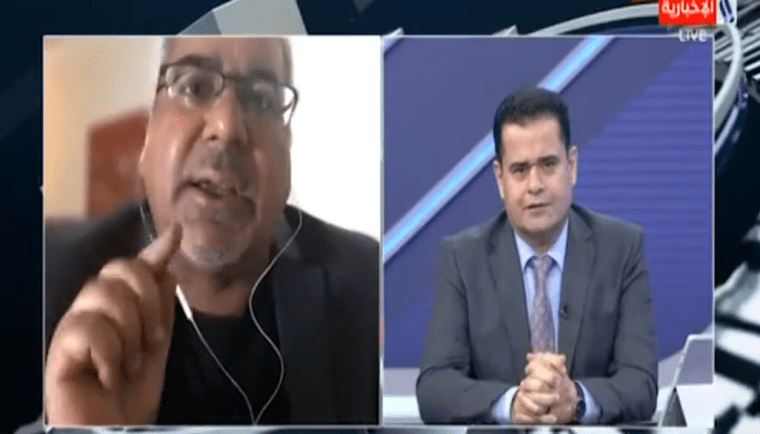New York, June 8, 2022 – Iraqi authorities must cease their legal harassment of journalists Sarmad al-Taei and Saadoun Damad, and ensure they can work freely and safely, the Committee to Protect Journalists said Wednesday.
On June 1, Damad, host of the program “Al-Mohayed” on the public TV broadcaster Iraqia, aired an interview with al-Taei, a freelance writer, in which al-Taei criticized Iraq’s judicial system and the leadership of Iran.
On June 2, the Karkh Courthouse in Baghdad issued a warrant for al-Taei’s arrest over his comments, according to news reports and the journalist, who spoke to CPJ in a phone interview. Al-Taei, who lives in the Iraqi Kurdish city of Erbil, told CPJ on Tuesday, June 7, that he remained free and believed that local authorities would not comply with the arrest order.
In a statement on Tuesday, Iraqi authorities said unnamed journalists could face charges under Articles 226 and 229 of the penal code, which criminalize insulting the courts. If charged and convicted under Article 226, the journalists could face a fine and prison terms of up to seven years; Article 229 imposes a fine and prison terms of up to three years.
“Iraqi authorities must cease their harassment of journalists Sarmad al-Taei and Saadoun Damad at once. Journalists should not face arrest and potential criminal charges over their political commentary,” said CPJ Middle East and North Africa Program Coordinator Sherif Mansour, in Washington, D.C. “Instead of threatening journalists with detention, Iraqi authorities should work to protect members of the press from threats and intimidation.”
Al-Taei is the former editor-in-chief of the Al-Alam newspaper, and now contributes to the website Al-Monitor and other media outlets, he said, adding that, “I criticize a lot, especially the [Iranian] Islamic Revolutionary Guard Corps.”
Iraqia took “Al-Mohayed” off the air shortly after al-Taei made those comments, according to al-Taei and an employee of the broadcaster who spoke to CPJ on the condition of anonymity, citing fear of prosecution. The show has been suspended, according to news reports and the employee who spoke to CPJ.
The Iraqi Media Network coalition of broadcasters, which includes Iraqia, aired a statement later that day saying it “regrets the offense” made by a guest on one of its shows.
After the program aired, armed crowds surrounded Iraqia’s office in Baghdad, and many pro-Iranian Twitter users called for al-Taei and Damad to be “punished” and arrested, according to news reports and tweets reviewed by CPJ.
On June 2, the Iraqi Judicial Association, a professional group of judges, issued a statement accusing unnamed journalists of being part of a “systematic, planned, and continuous campaign to target the Iraqi judiciary,” and the Iraqi Federal Supreme Court said in a statement that there was “an agenda against the judiciary system.”
The Iraqi Communications and Media Commission, which oversees media outlets in the country, also issued a statement decrying “unprofessional offenses against Iraqi national symbols.”
Al-Taei said that he and Damad had been targeted in “a smear campaign” by people affiliated with Iranian militias, which had resulted in the suspensions of his Facebook and Twitter accounts. Twitter’s press office replied to an email from CPJ saying that al-Taei’s account had been suspended “by mistake,” but the account remained suspended at the time of publication. Facebook did not reply to CPJ’s emailed request for comment.
CPJ emailed the Supreme Judicial Council in Iraq, the Iraqi Media Network, and the Communications and Media Commission for comment, but did not receive any replies.
CPJ called the Karkh Courthouse in Baghdad for comment, but the call did not connect; CPJ also emailed the court, but received an error message that the email could not be received.
